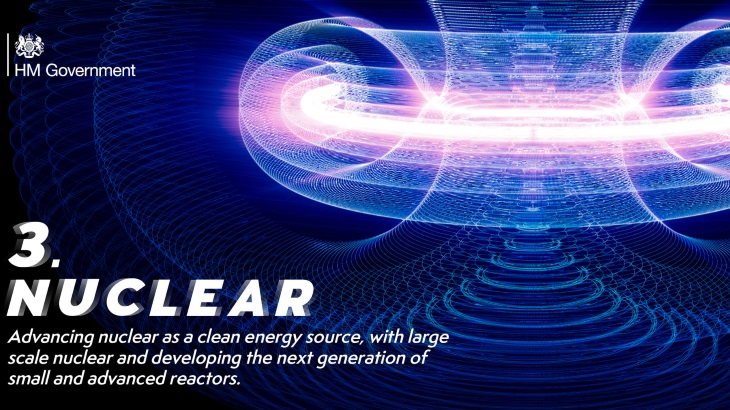UK includes new nuclear in 'green industrial revolution'

The inclusion of nuclear power reflects advice that the Nuclear Innovation Research and Advisory Board (Nirab) gave in a recent report for the Department for Business, Energy and Industrial Strategy. Nirab said there that it would be prudent to plan for nuclear energy to provide at least half of the firm low-carbon electricity not provided by renewables.
The plan announced today also includes a previously announced pledge to quadruple offshore wind power capacity by 2030, to 40GW, and "to turn water into energy" with up to GBP500 million of investment in hydrogen. It also includes investment of more than GBP2.8 billion in electric vehicles and establishing a new world-leading industry in carbon capture and storage, backed by GBP1 billion of government investment for clusters across the North, Wales and Scotland. The government's GBP1 billion energy innovation fund will help commercialise new low-carbon technologies, Johnson said, such as the world’s first liquid air battery, and the City of London will become the global centre for green finance through the sovereign bond, carbon offset markets and disclosure requirements.
Writing in the Financial Times today, Johnson said the 10-point plan "will turn the UK into the world’s number one centre for green technology and finance, creating the foundations for decades of economic growth". His government will establish a “task force net zero” committed to reaching net zero by 2050, and through next year’s COP26 summit it will urge countries and companies around the world to join the UK in delivering net zero globally. "Green and growth can go hand-in-hand," he said. "So let us meet the most enduring threat to our planet with one of the most innovative and ambitious programmes of job creation we have known."
Landmark moment
The Climate Change Committee (CCC) described Johnson's announcement as a "landmark moment". In May 2019, the independent body set up to advise the government on climate change laid out a set of proposals to enable the UK to achieve net zero greenhouse gas emissions by 2050.
John Selwyn Gummer, the CCC's chairman, said today: "I am delighted to see the breadth of the Prime Minister’s commitment. This must now be turned into a detailed road map - so we all know what’s coming down the track in the years ahead. Our homes, the way we travel, our industries, our land, and all of us individually have a role to play as we strive to lead the world in tackling climate change. The good news is that we can also reap the rewards - improved health, a stronger economy, a boost for UK jobs and the ability to tell our children and grandchildren that the UK acted in time."
Chris Stark, chief executive of the CCC, added: "This is our path out of the economic challenges created by the COVID crisis. And it is a set of commitments that will raise the UK’s credibility ahead of the pivotal COP26 climate summit next year."
Details to come
Tom Greatrex, CEO of the UK's Nuclear Industry Association, welcomed the scale of the ambition indicated by the plan, noting that more details will come in the Energy White Paper, which is expected later this month.
"Meeting net zero while delivering long term, skilled jobs, economic growth and export potential are the opportunities for the country. Low-carbon technology working together - not being pitted against each other - is the right approach to take,” Greatrex said.
“We welcome the government setting a 2030 target for low-carbon hydrogen production. Nuclear power can produce clean, 'green' hydrogen without any carbon emissions, so it has a critical role to play in developing the hydrogen economy. We hope the government will support 'green' hydrogen, since our goal is to use hydrogen to reduce emissions. There is no use in deploying hydrogen if we have to emit large amount of carbon to create it,” he added.
Ian Liddell-Grainger, chairman of the All-Party Parliamentary Group on nuclear energy, said new nuclear power will "dramatically cut our emissions and generate thousands of good, highly skilled jobs across this country". He added: "I look forward to the government setting out the detail in the Energy White Paper, and getting new projects over the line.”
One of those projects is Sizewell C, the proposed new nuclear power plant on the Suffolk coast. This will be a near replica of Hinkley Point C (HPC), which EDF Energy is building in Somerset and, like HPC, it will be able to supply 7% of the UK's electricity once it enters commercial operation.
EDF's UK CEO Simone Rossi said the 10-point plan is "a game changer and we are right behind it", not only for nuclear, but also for wind, solar, storage, hydrogen, electric heating, energy saving and electric vehicles. He added that HPC is providing GBP14 billion of work to the UK supply chain.
Sizewell C Managing Director, Humphrey Cadoux-Hudson, said Sizewell C is the only large-scale nuclear project ready to begin construction in the UK. "We look forward to moving ahead quickly with the government on an innovative funding arrangement to achieve best value for money for consumers,” he said.
Supply chain
Sizewell C Consortium - a group of more than 100 companies and organisations from the UK nuclear supply chain to encourage the government to support a state-guaranteed financing model for Sizewell C - welcomed the Prime Minister's commitment to large-scale nuclear.
The group’s spokesperson, Cameron Gilmour, said the Sizewell C project will create "tens of thousands of jobs in the UK industrial heartlands".
Separately, French nuclear engineering firm Framatome announced that it had joined the Sizewell C Consortium. Marc Duret, managing director of Framatome in the UK, said: “Framatome has called the UK home for more than 25 years and we remain committed to contributing to the country’s economic recovery and clean future with low-carbon energy."
Framatome said it is helping the UK reach its 'net zero by 2050' target by contributing to the construction of two EPR reactors at HPC and two at the proposed Sizewell C plant. Framatome also assists maintenance and long-term operations at Sizewell B. As part of the Sizewell C project, Framatome said it expects to create 100 British jobs with engineering and construction expertise.
Last week, the UK SMR consortium, led by Rolls-Royce, said it expects to create 6000 jobs within the next five years and 40,000 in 15 years "if the government makes a clear commitment" that enables a fleet of 16 small modular reactor power stations to be built over the next 20 years.



.jpg)





_79311.jpg)


